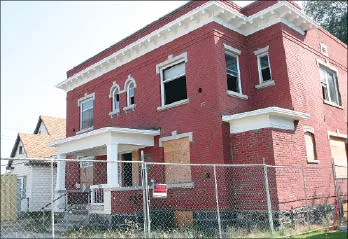Nonprofit here renovating historic apartment building
East Central structure will house low-income residents once updated

A Spokane nonprofit has started renovating a 101-year-old historic apartment building it owns in the East Central neighborhood and plans to lease the building's units to low-income residents once renovations are completed.
The two-story brick structure, called the Rose-Kly-Cecil Apartments, is located at 1726 E. Third and is owned by the East Central Community Organization.
The eight-unit, roughly 4,300-square-foot building, which is visible from Interstate 90, was constructed in 1910. It was added to Spokane County's Register of Historic Places early last year due to its age and the fact that it's one of the only multifamily buildings in the East Central neighborhood built during that time period, the county's historic preservation office website shows.
The cost to renovate the building, which has been vacant and in disrepair for about five years, is expected to be more than $600,000, says Chris Venne, a board member for the ECCO who's involved in overseeing the project.
D.R. Construction Services LLC, of Spokane, is doing that renovation work, and Zeck Butler Architects PS, also based here, designed the upgrades.
Venne—who also works as finance director for the Spokane office of Community Frameworks, a nonprofit affordable-housing provider—says the structure is in the path of the planned interchanges that are to be built years from now to connect I-90 and the North Spokane Corridor. Because of the building's placement on the county's historic registry, though, Venne says it's protected from being torn down to make way for the interchange.
"We want to bring back some affordable housing opportunities in the area," he says. "Our neighborhood is losing so many houses to the freeway, and this way it will be kept."
Venne says that ultimately the building will have to be moved, but that such a move won't occur until after it's been renovated. Also, because no funding has been secured for the construction of the north-south freeway from Francis Avenue to the Spokane River, nor the connection of it to I-90, it's likely that the building won't have to be moved for five years or longer, Venne says.
The ECCO's long-term plan is to move the brick building about half a block southeast, to a lot the organization also owns at the northeast corner of Fourth Avenue and Pittsburg Street, where there's currently a community garden, Venne says.
In order to move the structure, though, he says that two or three homes adjacent to it will have to be torn down after the Washington state Department of Transportation purchases those properties.
Venne says the plan that's currently being considered to relocate the building is for the state agency to purchase the property from the ECCO, and then auction off the apartment structure to a company that would move it to the nearby lot. The ECCO then would buy back the building, he says.
"As long as it's moved and remains affordable housing, we are okay with that," Venne says. "They (DOT officials) know our plan and are aware that it won't be demolished ... but how we get there and how that happens is an interesting negotiation."
Despite its slightly unkempt outward appearance and boarded up windows, Venne says the overall structure is in good condition. The interior already has been gutted so that asbestos and lead paint abatement work could be done before the renovation work started.
He adds that part of the renovation project involves reinforcing the building so it will be able to withstand being moved in the future. Another goal of the renovation is to make the building as energy efficient as possible, he says.
Venne says that the ongoing renovation project is expected to be completed by next spring, after which the ECCO will seek tenants to live there.
Venne says that while he's not sure when the last time the building was occupied—likely in the early or mid-2000s—he believes its former owner let the apartments fall into disrepair until they were no longer livable. The property went up for auction after the previous owner lost the property due to bankruptcy, he says.
The city of Spokane then purchased the historic structure in late 2009 and transferred ownership to the ECCO about a year ago, which eventually will pay back to the city a loan of $114,000, says city spokeswoman Marlene Feist.
Venne says that a $600,000 federal stimulus grant given to the city of Spokane is funding the majority of the renovation costs, and funds to cover the cost of lead paint removal were provided by the city's Lead Safe Spokane program.
Related Articles

_c.webp?t=1763626051)

_web.webp?t=1764835652)
